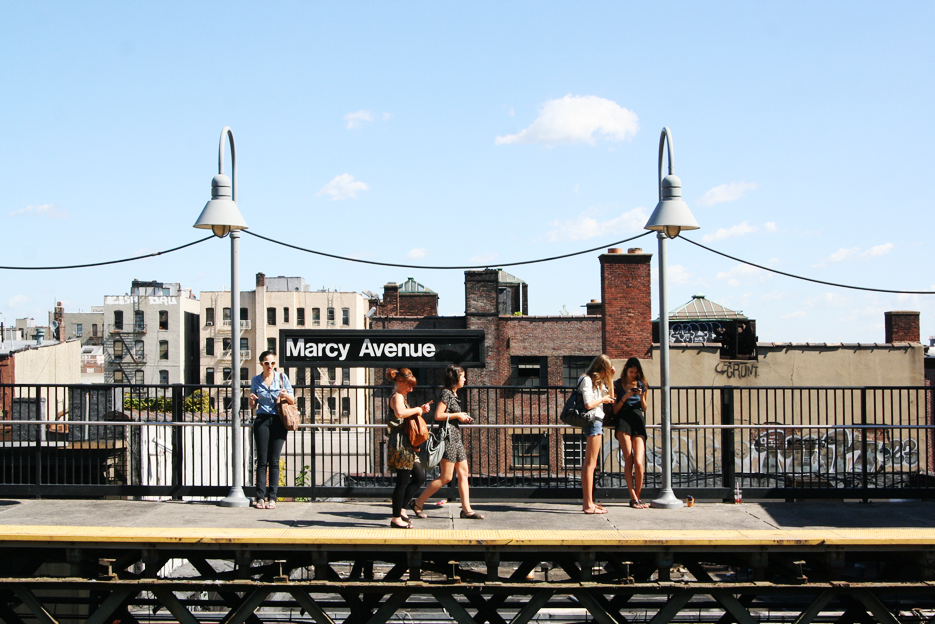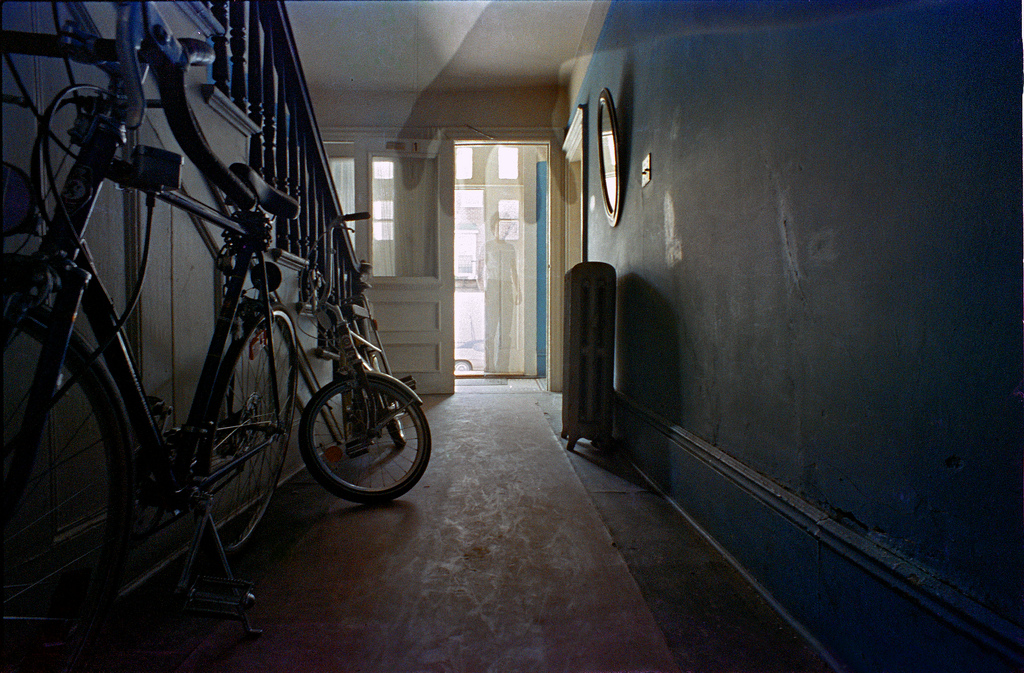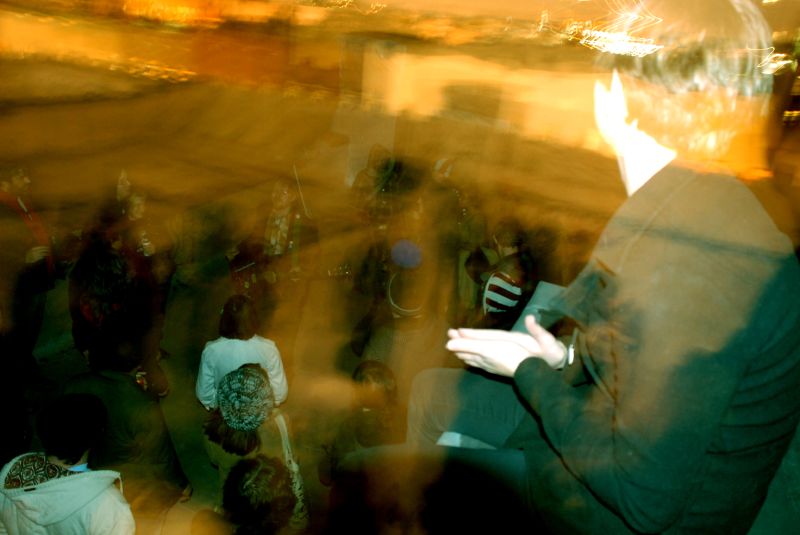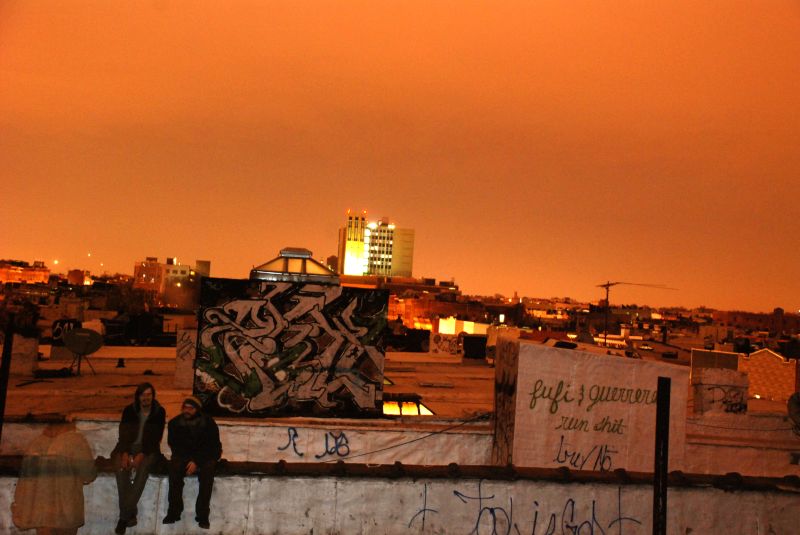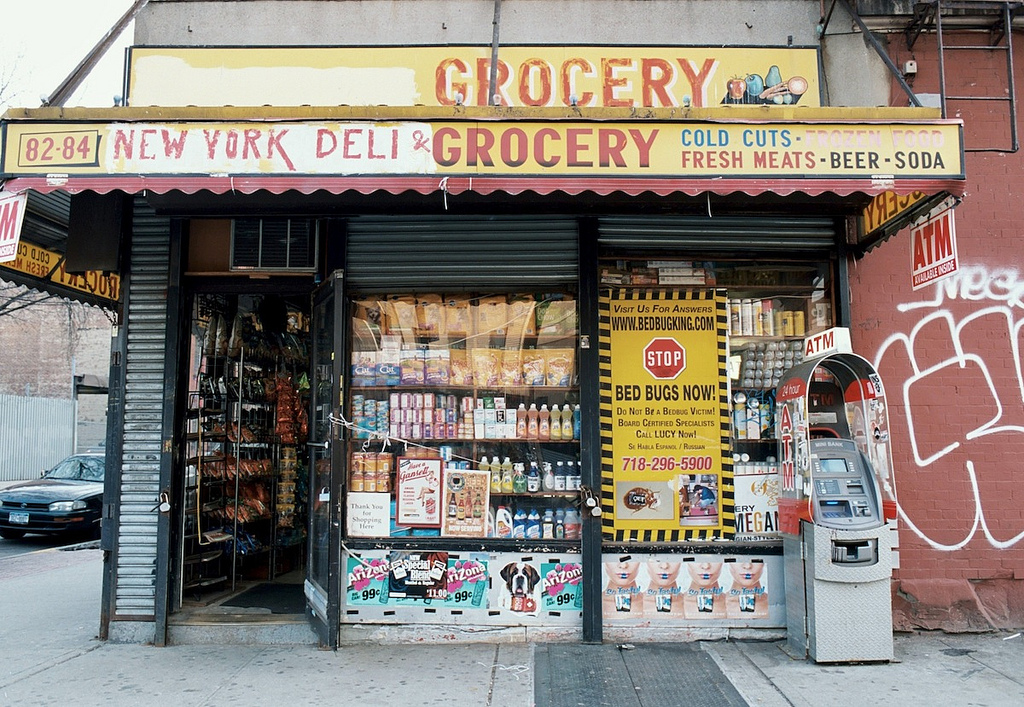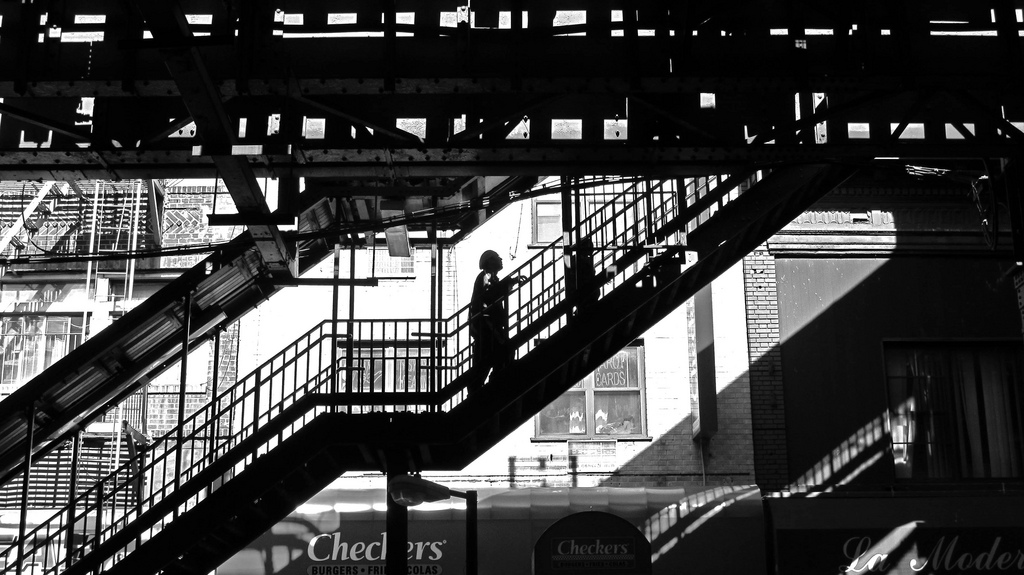You live on a block in Brooklyn and you like it. You’re in the middle years of your twenties and there’s a chance you’ll still become someone, depending on the way things happen, but you’re close to deciding that if even if or when you do you’ll live here forever. Admittedly you’re biased. You moved from East 4th street in the fall, after your breakup, and what Brooklyn had you needed. Clean wood floors, innocent walls, and the shabbily beautiful walking up and down on Bedford. You turned your collar up against the wind on Grand, lingered in the bars, and believed that it was now, this time, in this apartment, that everything would be as perfect as you meant it. In the winter when it snowed no one shoveled for a week and you slid and scraped across the dappled ice. Your cheeks were red, and you didn’t mind falling, because you felt that this falling, like the other things in your unshoveled Brooklyn, was real.
But still you didn’t love it, not your block particularly, not until the summer came and the whole thing bloomed together. The grandmothers springing up like they’d been seeded there all winter, bright green abuelitas planted in the sandstone stoop in fall to shoot up sudden some May morning and persist all summer, offering bent wrinkled smiles and organizing tenant meetings in two languages. On the next stoop west, the mothers, who ignore you, and then at the other end, outside the bodega, the young men, loitering and catcalling with their round ecstatic Os and electric ayyyys, wrong but you are young also and a man and fall in love with women in the subway but say nothing and feel wrongness is forgivable. And then in the center, well-defended from both ends, the children winding black tape over foamy stickball bats and contesting endless world series beneath anointing streetlights, chasing their sisters (in their bright and cotton shirts, butterflies or sewed-on flowers in oversaturated colors, aging now and then to leggings, makeup, clumsy teenage flirting)) in gleeful circles when the ball is stolen, riding bicycles sometimes, but mostly only swinging and cutting at the whiffle, tagging Nissan fence and hydrant before returning to the abandoned homestoop, where the bottom of the order lingers madly, who glare at you as threateningly as they can pretend, who gum and glower at the night, and practice for the summer when they too will walk down west and join their cousins in front of the bodega. When you are young, you think, you are always practicing for something. When you are a seedling with just a little square of sky you will grow in that direction.
Two blocks west there hulks another Brooklyn, a Brooklyn of branded preschools and glacier-blue glass buildings competing with Manhattan, but you aren’t competing at the moment and you like this Brooklyn that is yours.
One night on your way home you interfere. It’s an accident. You slow down to see the full-count pitch and then a whiffle ball bounces in front of you and there’s a girl behind it, white like you. You look at her and she looks at you, but someone else is talking.
“Hey Baby,” is what he says. In a tart high voice. You’ve seen him before. He’s on the top step. In his Yankees hat. He bats right, throws right. Acts misogynist, apparently. Ten, he can’t be more than. You’re climbing the steps, for some reason.
“What you want, white boy?” he asks you. He’s playing for the cleanup hitter and the leadoff, one fat and one little, curled on the steps beneath him. His small smooth bones folded out along the stoop.
“You can’t talk to women like that,” you say.
“I’ll talk how I want,” he says. “You ain’t no talk police.”
“It isn’t right,” you say. “It’s, it’s completely rude.”
“Rude, huh?” He says. “Alright, white boy, you can go head.”
“One day,” you struggle out, “you’ll realize other people are people, too,” and then decide to add, “even women.” You realize this is as far as you’re going to get. There’s the unlikely hope you’ve been sufficiently portentous. And, of course, the girl has vanished. You walk home.
You see her in the hallway that weekend and for a moment you think it’s a trick, but it isn’t. She’s checking her mail.
“Hey!” she says.
“Hey,” you say, more slowly. “Are we neighbors?”
“Are you at home?” she asks.
“I’m in the hallway,” you say. “But, I mean, technically, the hallway of my building.”
“Then, I guess we’re neighbors,” she says. “I’m Kim.”
“Hi Kim,” you say. You introduce yourself. On the second meeting she’s almost as pretty as you’d hoped she was the first time.
“Thanks, by the way,” she says.
“For what?”
“Oh, the other night. That was you, right? It’s—if you were a girl you’d know. It’s kinda useless. But thanks for trying.”
“Oh, yeah,” you say, borrowing her quick, bright ‘Oh.’ “I wasn’t really thinking about it.”
“Yeah,” she says, “anyways, thanks.”
“Yeah,” you say, and then go for it. “Hey, we’re having a party in the backyard in a couple weekends if you want to come. No heckling, I promise.”
“Wait,” she says, “You have a backyard?”
“We,” you say, “neighbor.” It’s a stock surprise but you sort of hadn’t expected it from someone who lives in the building. You live on the first floor and the yard is yours functionally if not legally.
She agrees to come to the party. There isn’t a party but you’ve given yourself two weeks and that’s plenty of time. The way lust works is, for the hour after you talk to her, everything is perfect.
The party stays good until late. Someone asks her how she knows you. “She’s a neighbor,” you say, a little loudly.
“I’m a neighbor,” she agrees, “but that doesn’t mean there isn’t a good story.”
“Oh, hell,” you say.
“No, do you always do that? Did he tell you all about how he saved me?” she asks to the group.
“Always,” you say. “No better way to meet women.”
“Good to know. It seemed that way.”
“Every time,” you say. “I was gonna hire a couple of the neighborhood kids on retainer to heckle girls when they see me coming.”
“You should look into that,” she says.
And then you tell the story. She interrupts adroitly, lets you do the same, smiles constantly, remembers that his Yankees hat was two sizes too big. You may like Kim, you recognize you may want something bigger from her than a couple of exploratory Saturdays. Whether that’s a hope or a worry you can’t tell. Later she tells you it was pointless intervening.
“It’s not even about me,” she says, working on her beer. “It’s just about. It’s like, a category relationship. The point is…he’s one kind of thing and I’m a different kind and so he gets to behave however he wants. But I’m not really at stake in any way. I’m just. An access. For some power he wants to have. Was he really that young? I didn’t even notice. I don’t know. It used to bother me. When I moved here. But now I guess it just bothers me… like. Politically. Not personally. That’s easier?”
She stays late. You want to show her the garden but you save it. And then everyone is going to the bar. You invite her but instead she gives you her phone number and you make loose plans for a ‘drink sometime.’ You walk to the bar with your other friends, smiling. At midnight there are neither grandmothers nor mothers nor young children, only the young men on the corner and one forsaken boy, practicing wheelies in the middle of the street with carnival faces as he hauls the bike up towards him, balancing. You look to see if it’s the catcaller but it isn’t. You’ve named him Nomar in your head, and you haven’t seen him since that first night.
The next day you go and garden. Over the winter you were seeing this girl and she was going to a gardening thing at Brooklyn Botanical and it seemed like going would be good symbolically, she’d think you were adventurous or natural, so you went, and fell in love accidentally with the gardening rather than the girl. That was after you’d taken the advertising job, when you needed evidence you still existed as a soul. Since then you’ve learned how to cultivate the basil, and to fill the bottoms of the urns with packing peanuts, and you’ve learned painfully not to overwater, and the backyard has broken glass and stray cats and a washing machine whose rusting O looks like the Eye of Sauron, and this too is real, real gardening, you just have to be careful of the broken glass or hypodermic needles you find sometimes in the dirt. .
You text Kim for a week and then take her out for drinks. You don’t talk about Nomar at all since the party. You get a good laugh with the ‘your place or mine? ’ line, and then you end up at her place, because you ‘haven’t seen it,’ which is the same thing as you ‘haven’t cleaned your apartment since the party.’ It’s pretty good, and you both think so, and everything is just so.
In the morning it turns out that she doesn’t have any milk, and you can hear birds singing through the window, so you go to the bodega on the corner, with the cousins. They’ve rebranded as an organic bodega and they sell Oreos and dusty tins of Spam and also two brands of Kombucha and the four-dollar green juice you buy on the mornings you feel sick, and on Sundays at noon apparently they also sell lottery tickets for one and five and ten dollars to the grandmothers, who scratch them off right there in line with nickels from their purses. What you suppose about the nickels is that they’ve been curated specially for their luck, and what you suppose about the grandmothers is that they live piously and decently all week with icons of the Virgin in their hallways and exponentiating grandchildren, and moan quietly in church on Sunday mornings, permitting only afterwards, only on Sunday afternoons with their warm clean freshly-laundered souls, this brief escape of avarice. They scratch them off right there, in their ouroboric line, and trade the winners for however many more they’ll buy, and drop the losers in the silver scratch-dust on the floor. You suppose the losing is the liberation: that the joy is in the brief excuse of waste. Patchers, rebuttoners, vow-cleaving sisters of invention and sufficiency, feeding six people every week from food stamps and a small refrigerator, sworn enemies of chance and incident.
When you get to the front of the line you realize you’ve got expired milk, and you think of Kim dozing in the morning, and if she might have you once again when you get back, and then you think of Kim with food poisoning, and so you stand in line again.
The second time, you resent the grandmothers. Some of them must be bad grandmothers. Some must spill milk, and lounge on the sofa through reality-television marathons, must neglect their housecats, must be lunchbox-satisficers, indoor-smokers, mingy alcoholics, lame complainers for a mythical homeland. This makes you feel better about standing in line, but it’s as easy and as wrong, you realize, to assume virtue or criminality in poverty, you suppose: either way you are only consoling yourself, only congratulating your own success at recognizing their virtue or avoiding their indolence. And for this realization, of course, you congratulate yourself.
You buy the milk.
On your way out one of the cousins says something hilarious in Spanish and another, mirthing backwards, bumps into you. He isn’t looking. He turns around and starts apologizing, immediately stops, and looks right directly at you, right in your face. He’s wearing a Yankees hat; you’re wearing last night’s stupid gingham button-down. You’re holding milk. All the other young men are looking at you too. You’re finishing your apology, “So sorry, man, didn’t see you.”
And then they are looking at you. It’s a morning in June and they are all looking at you. You’re afraid they’ll try to stop you as you walk away. But they don’t. On your way down the block you look for Nomar. You fear dully that you have entered a fairy tale, but forgotten who is the little boy and who the god, and what is the enchanted forest.
Kim’s a violinist, and when you get back with the milk she’s practicing. She wants to know if you want to hear her current piece and of course you do. While she plays you keep thinking of Nomar’s cousins and protectors. Nomar’s cousins and protectors. Who will harm or glare at you. Who’d yet done nothing on the way in. May have been biding their time. The Spanish joke perhaps not a joke at all but a sinister signal. The bodega perhaps unwise to walk past at night. The advisability of creeping instead eastward, to Marcy, and around, which will take probably two minutes longer coming to and from the subway, and which you’ll probably forget when you’re drunk, which is of course the scariest—
But, now no one is playing the violin.
“What do you think?” Kim is asking.
“You sound incredible,” you say.
“Incredible?” she asks. “Tell me what you were really thinking about.”
“What do you mean?”
“People can tell, you know. Performers can tell? When you’re trying to make a serious listening face but aren’t listening at all? People can tell?”
“Sorry,” you say. “Listen, I’ve, ah, got a lot on my mind. This has been a great refuge. Last night. Sorry. I don’t know. I went outside and it was like ‘I’m awake! Time to think about what I can achieve today!’ And then. I didn’t listen.”
“Yeah,” she says. You get that she feels a little guilty and maybe it can be over but you decide to escalate.
“Yeah,” you say, “look, I really respect… I’m sorry. It matters. Sharing with people matters.”
“Jesus,” she says, “whose boyfriend are you? Give me my milk!” You’re pretty glad it’s a playfully weighted punch instead of a slap. But even so abruptly you’ve become one of two strangers who are for some reason standing in the same kitchen.
To your basil you’re never a stranger, and basil’s never bothered if your mind should wander. You’ve spent most of your life needing to be the best at verb, or to be the only noun, but basil doesn’t need that. It only needs you to be good enough. Today it is attempting to flower again. You sift the green stalks with your thumbs and pluck out the little white flowers. By Tuesday you will find three new leaves apiece.
Really, though, today is fig day. You bought the fig in a small pot from a windblown guy at the Union Square Farmer’s Market last week, and cradled it home for half an hour on the L train, thinking you knew how mothers felt, or heroes. The man told you it would need to be repotted if you wanted fruit, so you researched and prepared and today is the day to dig the small hole in the better pot and lift the whole cubed ball of figroot out into the soil you have made.
It’s harder than you expect. You grasp the fig with two hands and pull it out of the pot. But the pot comes with it. The pot is attached. And so: you move one hand onto the pot and pull again. You move your right foot onto the pot and pull with both hands and your back. Finally you improvise. You get the biggest knife and cut the rootball out. When you’re done you can lift it out with only one hand. The fig complains, loosens, wriggles free and hovers, gentle light faithful, in your hand.
You repot it. Planting is a soothing kind of worry. Worrying with hands and mind is different. You’ve always known this; when you had scabs on your knees, as a child, demanding to be touched and rolled and pulled from their pink moorings, that was worry, but it was also healing: hands working delicately to be sure that you were whole. And then later, later when your penis was discovered, which was soft and pink and spare and then suddenly insisted on itself, well, that was worry also, the way the hands worry. The way you pinch the flowers from the basil; the small white stars that disappear between your fingers. The way that flesh moves over skin, or time around a life.
The mind worries differently. You’ve been in New York for three years and you’re always bored or panicked. You’d thought that it would take six months for you to become yourself but maybe it will take forever. You take the L or J or M to work and then the lines don’t run all weekend. There is another life, you know, where to live differently is as easy, as simple and as definite, as to pinch the white buds from the basil or to repot the fig. But you have this life instead, in which you are yourself.
That night you think of Nomar, and what he could have told his cousins, and what his cousins might plan to do to you, and of whether you will have to start walking the other way home from the subway—soon you are thinking of Nomar himself. Nomar: a small body sleeping somewhere on one of the six floors stacked above you in the building, tucked in by his mother probably, with Yankees hat beloved on his bedside table and around him in the room an entire archaeology of childhood, and him growing every night into something older than himself. You had wanted him to be a plant, you guess, that you could pinch from and cause to grow a different way, but you had failed, and now there will in the future be another Nomar, one to sit and glare and call at girls, and before you can think too much about what that means you are asleep.
It takes you most of the week to collect yourself and go see Kim. When you do she marches you into the small living room of her small apartment and plays something on the violin while looking you directly in the eye. You really listen. It feels like a success. Then she sets down the violin and climbs onto you with both her legs around you on the couch, and she sits upright like a flame, and things are better. You guess you’ve gotten away with it.
When you walk down the block, you never see Nomar, and you always see the cousins, and you always wonder whether they are seeing you, and if so how. The police glide frequently along before the stoops in their cruisers or on foot, and historically have offered you little conspiratorial nods while they frisk the cousins with their buttress hands (splayed, knuckles pressed) against the wall. You’ve often felt guilty about this—this man from Jackson Heights with his indolent blue belly protruding flabbing against the cousins’ comprehensive tautness—but that Wednesday you don’t, you nod back gladly. The fig is rooting in the larger pot, lifting up green tongues to the little square of summer sky. The cousins have their own morality, and you hold them culpable for Nomar.
On your way back, late, the block is almost empty. A boy is riding his bicycle in thin ovals in between the cars, repeating in thin ovals. You can see him, and then he can see you, and then there is a purpose to his riding.
“Hey white boy, you save any girls lately?” he asks. It’s him, you think.
“No,” you say.
“Bet you ain’t fucked any neither,” he says.
“None of your business,” you say.
“Bet you fucked that one girl, though. That you stuck up for?”
“None of your business.” He rides past you, turns around a tree.
“Bet you wanted, to, though, right?”
You say nothing, and realize too late it’s a confession.
“Shit, white boy,” he says, “you just like anybody else.”
“What’s your name?” you ask, but he’s halfway down the street on his bicycle. Then you’re alone.
That night you can’t sleep so you go out at three and sit with the plants and a small glass of whiskey and you look around. There are tall old buildings, and two mulberry trees, and some number of chairs, and even more stray cats. Nomar had ridden in epicyclic loops around you, hauling back for wheelies when he meant to. You are filled with pity. There are glaciers coming.
Nomar: eking out doubles while the fielders botch the chain-link ricochet behind him, brave to white men on the vacant stoop. The world never his, not fully: only this brave scrap of Brooklyn. But then before too long the block as well will vanish, the backyard Barad-Dur churned under by advancing glaciers. And then a vanishing: all the games of baseball, grandmothers purring in the sun, the stray cats’ backyard congress. The sisters expiring into their mothers’ obesity, moving away, taking jobs as bank receptionists.
Time will take the block from Nomar, too, and with the block remove a life: child of old brown sandstone fronts and reeking empty courtyards and yellowed margins of the smoking aunts’ apartments, and a block where his virginity is not yet lost, where he will learn to roll his first blunt and take the bra off with just his left hand behind the back. The stoop he sat on like a throne and where he learned to spit and swing a bat and once told a white man to go ahead when he criticized how Nomar spoke to women—all this irretrievable, rendered into rubble and then nothing. Enclosed by ten-foot-tall contractors’ poles. Between them, plastic cloth with pictures of a building. And a phone number for an office in Manhattan. At the office they will speak no Spanish. In the pictured building no one will have ever grown up. And for Nomar the forgetting will be worse than the vanishing: cats, grandmothers, cousins, sisters, Nomars, all scattered, reeled out in throngs to Queens or Sunset Park or Red Hook or the beastly Bronx, and Nomar in his alarmed adulthood, come back to locate those heroic stoops and stadia, finding only the doorman of the glacier. Who will not be kind. Will glare. When the places of our youth are lost so too is our ability to pretend that ever we were innocent. And in that moment—this is what you think—Nomar would prefer to have a better system, would prefer to be considerate towards women, so that he might make a kinder representation of what was really lost, which was something better than glaciers, better than presumed by the police, and certainly better than what the cousins say to women.
But that is only what you think, when it is three A.M., and you can recognize yourself as the vanguard of the glacier, a first cold prescriber come to tell him how he ought to live, and that is all that you can think of.
You take Kim out for tacos, to the place across from the bodega that does pulled pork and turkey and also gourmet coffee. You’re sitting on the bench waiting when there’s a fight at the bodega. The fight has one man screaming on the corner with a baseball bat. Another lingering inside the door. Various seconds, adjutants and executors observing, noting as hungrily as yourself the timbre of their howls, the unquenched shaking in the shoulders.
“Did you ever get in a fight?” Kim asks.
“Yeah, one time I told a kid to stop catcalling some girls, and then…” You’re smiling underneath your sunglasses.
“No but really, did you?”
“I don’t know,” you say quietly, “kind of? What’s a fight?”
You were fourteen, small among the lockers. An 11th grader mocking you for something. You flying towards him with swinging arms and rising knees. He putting up his hands and laughing as though the joke had gotten better. You collecting your books and going to class. Realizing later he’d been twice your size.
“I’m not really a fight expert,” she says. “Once I wanted to break a girl’s violin because she was better than me.”
“One time I think I wanted to get into a fight.”
“Wanted to?”
“I don’t know, I was angry. I think I was in 8th grade? Somebody was making fun of me.”
“And…you wanted to hurt him?”
“No, that isn’t—that wasn’t how it was. For me, at least. I think I just felt helpless.”
“Helpless?”
“Yeah, fighting’s funny. I guess you were never a boy. I don’t know. It’s not, like, it’s not ‘Man, I hate this kid’s face, I hate his ribs, I want to damage him.’ It’s just—you feel small and you want some way of doing something. It’s more of an internal thing. At least it was for me. I just wanted to feel like I was real.”
“You’re right,” she says, “I’ve never been a boy. Who told you that was how you changed things?”
Other men, you figure. Here is what is mystical or ancient. To be a man. Distinguished however briefly by force or clarity of rage. Exacting vengeance on the grinding order of the world. Loud on a corner shrieking for justice. He is comforted, you think (as you once were) by thinking of it as a story: an arc bending towards some culmination or completion. In thinking that the fight, were it held, would have a purpose. Somehow the idea of fights is the idea of history. Through action we change or demonstrate ourselves. This idea comforts you as well but you cannot know if it is true. Plants and blocks change simply in their being: when can you identify the fig? Who has decided on the glacier? Yet here they have appeared.
“What happened to the girl?” you ask. “Did you break her violin?”
“No,” Kim says, “I didn’t think the violin deserved it, I guess? But then a month later her parents got divorced and she stopped playing altogether.” She finishes her coffee. “She was really really good.”
What you and Kim do is you finish your tacos. And then you walk across both streets, avoiding the fight with a long bending arc. Soon, or possibly already, the rage will leave and once it does there will be nothing in it. Only a man holding a bat on a corner in summer. You walk home on the far side of the street, by odd numbers and tall unknown stoops.
On the way home Kim invites you to a show.
“It’s not a show,” she says, “those are expensive and, like, boring. It’s a rehearsal.”
“That sounds interesting,” you say.
“Interesting?” she asks archly. Her thing now is to criticize your first responses if she thinks they’re too easy.
“Valuable. Like you’d get to see it grow.”
“It’s special,” she says, “art always pretends to be perfect, but it isn’t. We have to fuck it up a lot.”
“I always thought it just happened,” you say.
“No, it gets made,” she says. “You should come. I’d like you to come.”
You agree to come, and then when you get home you show her the garden. You have her pull a leaf from the basil and crumple it between the thumb and three fingers of her hand. When she lifts her hand to smell it her face is close to yours and the rhombic flecks of basil drift gently from her fingers and you see her face for the first time as something vegetal, which grew somewhere and will continue growing. She has always been attractive but is in this moment beautiful.
You are lifted into ecstasies. There are fruit that Kim would bear, if planted. You tour her around the garden, lifting the laden skirts of the tomato, teaching her to take the basil-flowers, and pausing together to consider the fig, thick and nubbly in the afternoon. It has grown. And then you show her again because there are things you forgot. Briefly you have the sense of the backyard as a stage, of your voice rising theatrically in exposition of a truth, of unknown audiences attendant. You will never be a violinist, and maybe not an anything; you don’t care.
She goes in before you and you linger. What you are wishing is that you could give up a little of some other moment to have more of this one.
You intend to go. You have every intention. You will arrive and sit in the back row of the hall, opening a small black notebook and taking stoic notes in ink. You even buy the notebook and the pen. You google the theatre, make plans to arrive on time, set an alarm for Saturday morning, and go to bed. You are thinking of the fig.
And then in the morning there is an unpredicted doom telling you to go and check the garden. Which you do. Radishes uprooted, tubers smashed on something and left brutal in the center of their planter. Scraps of tomato-vine still clinging from pathetic trellises. Of the basil, which you’d trusted, there is no sign at all. The happy urn is broken and—here you do let out a quiet whimper—the fig assaulted also, uprooted into wrenching pieces. Is it too poetic for there to be, on one of them, the first white blossom of a fig? But it can survive: it was a cutting and now is three. The pot is smashed and broken but perhaps.
You react heroically. You find the fig-shard with the greatest root and replant it, and then think and replant the others also. Perhaps there will be three. You water them carefully, digging your forefingers down into the thirsty dirt to check. You move it all outside your window. You are attended by stray cats. And you do cry a little for the basil, and for the tomatoes you will never eat, and for the violence done to radishes. All they had wanted was to grow, and not be killed.
You remember Kim when it is too late to go: you will arrive an hour after the rehearsals’ end. You text her instead, explaining, and then sit in your living room watching out the window to see if they return.
There is no return; you fall asleep.
When you wake up you have a voicemail.
“I got your text. And, what I want to say is, fuck off… do you get that when you defend a girl on the street, you aren’t defending her? Do you get that all you’re doing is rushing in as another fucking man to use your fucking power as a man to save her because she can’t save herself? I think you do get that. I think you know exactly what you’re doing. Just fuck off. I can’t stand the theatre. I can’t fucking stand it if there’s nothing real. I’ve never been a man and I’m glad. Don’t come over.”
You figure you’ll see her in a few days, and she won’t mind as much. But you don’t think too much about it. She seems like she’s overreacting. Something else is wrong that she’s projecting, or something. You’ll find out what it is.
Around dusk you decide that it was Nomar. It was Nomar, who crept out his dirty filthy little window and down the fire escape in his Yankees hat and in the necrotic floodlights did all he could to break you. Because he was angry. Because he was angry at you for asking that he change. Your thoughts have a feverish culminating clarity: Nomar is the past and you are the future and because of that he hates you. He is bound to. You have made it worse by insisting on the values of the future. But you were correct to. Your values were right and his were wrong. His violence is a case of his wrong values. His values will always be wrong. It is his fault. Kim is his fault.
For most of the evening you fester in these thoughts, thinking and casting infrequent glances out the window at your fig.
Then you decide to take action.
On your block there is everything there usually is, except there isn’t Nomar. On the next block they are shooting film. The taco place is shuttered. There is a train of white trucks and three men in t-shirts picking briskly at the remains of a buffet. Thick Rapunzel-braids of cable running indoor from the trucks. You go a block south. There is the end of a block party: a few children and one last praise band playing quietly. Men in sunglasses gazing at you with their open mouths. On the block west of that you see two dogs with striking blue eyes and white fur. In none of these places do you find Nomar. If you go one more block west you will be among the glaciers. So you go south again. You are almost at the subway. Here you find that it has started without your knowledge. There are bars with open windows and exposed-wood counters. There is an all-night breakfast-burritory. You are glad for these things but Nomar is not there. You turn north.
When you find Nomar you are going to teach him the lesson of his wrongness. You will sit him down and he will be made to understand. When you are done you will have saved one of them. You will hit him if you have to. At least just one. Maybe he will go to college.
You walk for an hour. You find the bodega with the cheapest beer, and two restaurants you should really try, and a bar that Kim will like. When you find him it is three blocks north and two blocks east, further than you’d thought he’d be. You see him from a long way away. He is sitting on a curb in front of a bodega with two friends. They all seem very small and very young. One of the friends is a girl and one is a boy and they are holding something in their hands.
When you get closer they are holding popsicles. You can see them in the yellow light of the bodega. You can hear that they are saying but not what. You can hear clearly that they are laughing. You are aware of the night around you. Nomar has a popsicle in his hand and he has taken his Yankees hat off and laid it beside him on the sidewalk. Now is the time for you to walk forwards and grab him by his shirt and instruct him in morality. But without the hat his head is very round. He has a round head and a thin childish line where the different shading of his hair begins. And he is eating a popsicle. A popsicle is a brief thing and this one is melting: colored sugared something down onto his fingers. He licks them off and laughs. All this, in the bright clammy summer night.
 Corley Miller is a writer living in Brooklyn. His fiction and nonfiction have appeared in Vol. 1 Brooklyn, the LA Review of Books, and elsewhere.
Corley Miller is a writer living in Brooklyn. His fiction and nonfiction have appeared in Vol. 1 Brooklyn, the LA Review of Books, and elsewhere.

